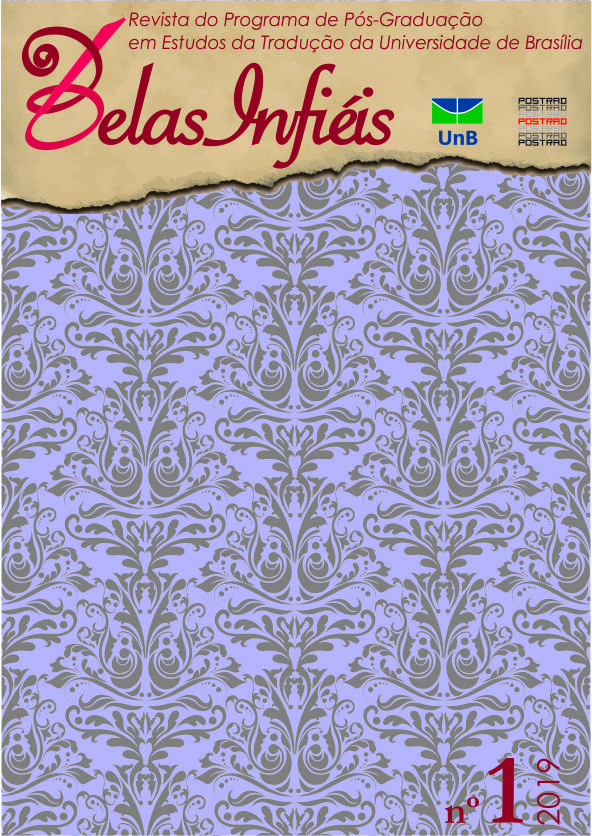A tradução de textos sagrados em Libras:
os Dez Mandamentos atravessados por diferentes vozes discursivas
DOI:
https://doi.org/10.26512/belasinfieis.v8.n1.2019.13012Palabras clave:
Libras, Textos sagrados, Os Dez MandamentosResumen
Este estudo visa a investigar a tradução de textos sagrados para Língua Brasileira de Sinais (Libras), tendo em vista a utilização desses materiais na formação de tradutores e intérpretes de Libras dentro e fora das instituições religiosas. Para tanto, valer-se-á das contribuições teóricas de Bakhtin (1992; 2003) e Sobral (2008), Gohn (2001), Jonings (2003) entre outros, a fim de conhecer os modos como o discurso divino é produzido e os elementos contextuais que interferem na produção desses objetos culturais. No desenvolvimento deste trabalho, foi realizada uma pesquisa bibliográfico-documental, recortando como objeto de análise dois vídeos traduzidos para Libras por duas instituições religiosas distintas, baseados no texto bíblico descrito em Êxodo 20:1-17, que trata dos “Dez mandamentos”. Os resultados revelam que a atuação dos tradutores e suas escolhas tradutórias são diretamente influenciadas pelas instituições religiosas e seus discursos, pelos dispositivos de controle e pelos lugares sociais que esses sujeitos ocupam no interior dessas instituições.
Referencias
ASSIS SILVA, C. A. Cultura surda: agentes religiosos e a construção de uma identidade. São Paulo: Terceiro Nome, 2011.
BAKHTIN, M. M. Os gêneros do discurso. IN: Estética da criação verbal. 4. ed. São Paulo: Martins Fontes, 2003.
BAKHTIN, M. M. (VOLOCHINOV. V. N.) Marxismo e filosofia da linguagem: problemas fundamentais do método sociológico na ciência da linguagem. 11 ed. São Paulo: Hucitec, 1992.
BARBOSA, Heloisa Gonçalves. Procedimentos técnicos da tradução: uma nova proposta. Campinas: Editora Pontes, 2004.
FILHO, J. C.; COIMBRA, D. P. Um estudo exegético em êxodo 20.1-6. Monografia, 2009. Faculdade de Educação Teológica da Amazônia. Disponível em <http://www.metodistavilaisabel.org.br/docs/UM-ESTUDO-EXEG%C3%89TICO-EM-EXODO-20.pdf>. Acesso em: 01 mar. 2018.
GOHN, C. Pesquisas em torno de textos sensíveis: os livros sagrados. IN: PAGANO, A. S. (Org.). Metodologias de pesquisa em tradução. Belo Horizonte: Faculdade de Letras, UFMG, 2001. p. 147-170.
KEELEY, R. Fundamentos da Teologia Cristã. Traduzido por: Yolanda Krievin. São Paulo: Vida, 2000.
KONINGS, J. Tradução e traduções da Bíblia no Brasil. Revista Perspectiva Teológica, v.35, 2003, pp. 215 - 238. Disponível em: <http://www.faje.edu.br/periodicos/index.php/perspectiva/article/viewFile/574/998>. Acesso em 01 mar. 2018.
NAPOLITANO, M. “Fontes audiovisuais: a história depois do papel” IN: PINSKY, Carla (Org). Fontes históricas. São Paulo, Contexto, 2010.
NEVES, M.H.M; LOPES, M.M.M. Texto Bíblico e “tradução”: a “voz divina” no plano humano da coenunciação. Cadernos de Tradução [online]. 2016, v. 36, n.2 p. 205-236. Disponível em: < http://dx.doi.org/10.5007/2175-7968.2016v36n2p205> Acesso em: 01 mar. 2018.
SELLIN, E.; FOHRER, G. Introdução ao Antigo Testamento: livros históricos e códigos legais. Traduzido por: D. Mateus Rocha. São Paulo: Paulinas, 1977, vol. 1.
SOBRAL, A. Dizer o 'mesmo' a outros: ensaios sobre tradução. São Paulo: SBS-Special Book Services, 2008.
Descargas
Publicado
Número
Sección
Licencia
Copyright Statement
Given the public access to this journal, the texts are free to use but requires the recognition of the original authorship and initial publication in this journal to be properly stated.
The journal allows the use of works published for non-commercial purposes, including the right to submit the work to publicly accessible databases. Published contributions are the sole and exclusive responsibility of the author(s).
- When submitting papers to be evaluated by the Belas Infiéis journal, the author(s):
- Declare that the contents of the contributions are original and of their original creation, being entirely responsible for their content if there is an objection by third parties.
- Claim to be aware that they should not commit academic plagiarism.
- Declare that the manuscript has not been published, completely or partially, in Portuguese or another language. If it is a translation it should be submitted to the Translated Articles section.
- Declare that the manuscript is not being evaluated by other journals.
- Declare that the manuscript was not submitted to another journal simultaneously.
- Commit(s) to inform the journal of any kind of error or inaccuracy in their contribution (published, in evaluation or in editing) and to collaborate with the editors to make due corrections of the article (when in evaluation or editing) or erratum/retraction (after publication).
- Declare that there is no conflict of interest regarding the published work.
- Authorize its release if it is accepted for publication without any kind of monetary compensation.
- Agree to assign non-exclusive rights to publication to the magazine, remaining free to make their contribution available in other media as long as the publication of the first version in Belas Infiéis magazine is mentioned. They also authorize Belas Infiéis to assign their texts for reproduction in content indexers, virtual libraries and similar platforms.
- Maintain copyright and grant the journal the right of first publication, the work being licensed under theCreative Commons Attribution License.
- Is/Are allowed and encouraged to publish and distribute their work online after the editorial process, which may increase the impact and citation of the published work.
- Authorize the editorial team to make textual adjustments and to adapt the article to the publication rules, when necessary.



















